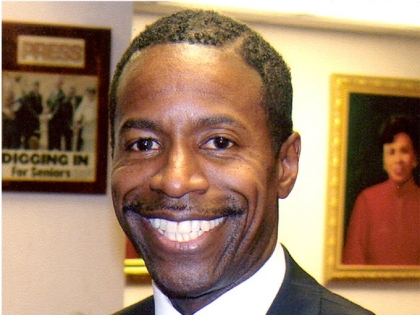
Democratic Leader Smith Praises Budget
Malcolm A. Smith
March 31, 2007
State Senate Democratic Leader Malcolm A. Smith said the 2007-08 State Budget "is filled with good news for the people of New York."
Smith said his goals, which included a significant increase in education aid, targeted tax relief for middle class families and appropriate levels of health care spending, "were all achieved in the new budget."
The budget, in fact, contains $1.3 billion in targeted property tax relief, as well as the largest increase ever in education aid, more than $1.7 billion, for a total school aid package of $19.2 billion.
The budget will also extend health insurance to the state's 400,000 uninsured children and provide $200 Million in funding for new preventive and primary care initiatives. Additionally, more than $400 million in proposed health care cuts was restored, with $377 Million going to hospitals and nursing homes.
Smith said he was also very pleased that the Governor succeeded in changing the State's inequitable school aid formula that has shortchanged many high-needs, inner-city schools for decades. "Finally," Smith said, "school aid will be distributed based on educational needs, rather than political considerations."
Smith is also pleased the cap on charter schools was doubled to 200. Half of those new schools will be in New York City, where they are most needed. He noted that the budget would also provide $22 million in special transition aid to those school districts that have been financially hurt by a significant number of charter schools.
The budget is also good for business, Smith said, because it includes a reduction in the base tax rate for companies from 7.5 percent to 7.1 percent, and savings of more than $100 million this year, much of it targeted to the manufacturing industry. It also features investments to create jobs in new emerging technologies, such as stem cell research and nanotechnology.
Housing and transportation needs were also addressed in the budget, Smith said, with a $50 million increase for affordable housing, an increase in funds for public housing of $5.2 million and $1.2 billion in new funding for transportation projects.
The budget also makes considerable strides in reforming the business-as-usual culture in Albany. New accountability standards will require schools and municipalities that receive additional aid to show positive results. And a new False Claims Act, which the Senate Democrats have long fought for, will help to root out fraud and corruption.
This budget also begins the process of reforming New York's Medicaid system, by far the State's largest expenditure. Streamlining the system helped curb the Medicaid growth rate, which had been at eight percent since 2001 and was reduced to less than two percent in the new budget.
Share this Article or Press Release
Newsroom
Go to NewsroomPhoto of the Week - Jefferson Diggs street renaming
October 7, 2013

Senior Appreciation Luncheon 9/16/13
September 20, 2013

SE Queens Elected Officials Kick Off Senior Appreciation Month
September 9, 2013

Photo of the Week
September 5, 2013
